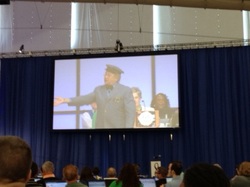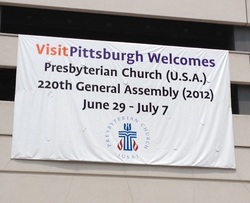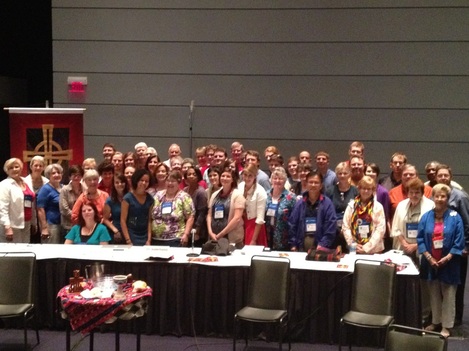 Do you recognize that photo? It's Mr. McFeely, from Mr. Rogers' Neighborhood. Fred Rogers was an ordained Presbyterian pastor whose special ministry was to serve children. He served faithfully through his PBS program for years, which was filmed in Pittsburgh, PA, the location of this year's General Assembly meeting. Mr. McFeeling made a 'special delivery' to drop in and wish us well at our meeting. Moments like those at GA are special. They remind us of the good things Presbyterians have done and are doing in the world as part of the larger body of Christ. Those moments helped sustain me during the difficult hours of working in committee. In this post, I want to share with you my experience on the Civil Unions and Marriage Issues Committee, and tell you some of the recommendations that other committees made to the full General Assembly (plenary session). Because the process is a little muddy, here's how things work: in the two years leading up to General Assembly, presbyteries may submit overtures (like a bill in Congress) to be voted on at the GA meeting. Presbyteries must receive a majority vote on their overture in order to send it to GA. This year, we received tons of overtures from presbyteries regarding changes in language in the Book of Order (our constitution), new issues of peace and justice they would like the PCUSA to support, and programs they hope the church will create. GA also receives some overtures from the church's denominational offices. Every overture is assigned to a different committee to be studied at GA. The committees are made up of commissioners elected to attend the meeting. About two and half days of the eight day GA are spent in committee. The committee has to make a recommendation to the whole body, called the plenary, about whether or not the overture should be approved, disapproved, referred for more study and/or amended in some way. The plenary hears the recommendation from the committee, allows time for debate and then makes the final vote on each overture. I served on Committee 13, which studied how we define marriage in the church. We had about 50 members on the committee. As my committee moderator said, "we were given an impossible task - to solve the issue of defining marriage for the church." Throughout most of those two days, it did feel impossible. I came really wanting to listen for the Spirit. But I also came hoping to hear something new in this debate. I have been aware of and immersed in the discussion surrounding issues of sexuality in our church for years, but was hoping that at this major event, we might discover a new path or come to some breakthrough that would lead us forward. For people who had little knowledge about the debate or really didn't know where they stood, I think there was some clarity. For others of us, it was a difficult discussion and one that we felt we had heard many times before. That made it hard to know how to move forward together. Overall, there were three choices about what we would recommend to the plenary. 1.Re-affirm the church's current understanding of marriage, between one man and one woman 2.Change the church's understanding of marriage to be between two people 3.Issue an Authoritative Interpretation (AI) that would allow pastors and churches in states where same-gender marriage is legal to perform same-gender weddings without fear of prosecution in the church disciplinary process. [An AI is a statement that tells the church how to interpret our constitution.] For two hours, we hard from people inside and outside the church in open hearings. Each one received one minute to speak about how they felt on the issue, how they are impacted by it, and how they sense God leading us. The variety of voices was wide: people who claimed to be recovering gays urging us not to change the definition, pastors who had been prosecuted by the church for marrying gay couples, young people on all sides of the issue who want the church to continue to be strong for their generation, and members who said their church will leave the denomination if we make a change. That last one, which was repeated over and over, unfortunately, felt a lot like a threat Later, we also heard from Overture Advocates - representatives from the presbyteries who had sent us the different overtures about why they were asking us to approve their recommendation. Eventually, our committee had discussions in small groups about how we were feeling and where the Spirit was leading us. On the second day, we moved into our official business and began to conduct our work by voting on what to do. Though committees rarely issue new overtures, that's one thing our committee decided to do. We agreed to recommend that the whole (congregations, presbyteries, etc.) engage in a study of marriage during the next year and half. Though this is a hopeful idea, it remains to be seen whether leaders will really take up the challenge to have such a wide-ranging and potentially contentious decision. We also voted not to re-affirm the current understanding of marriage, and also not to issue an AI. The vote on the AI, however, was very very close. Finally, we moved onto the overture changing the understanding of marriage to include two people of any gender. To everyone's surprise, that vote passed in committee by one or two votes! Together, those were the recommendations we took to the plenary session. Stay tuned to Part 3 for what happened there. For myself, I had gone in thinking that an AI was a bad idea, as it seems to take away the voice of presbyteries, since it is automatic and not voted on by the lower councils. However, I was persuaded that it actually was the right way to go. It would un-tie the hands of churches and pastors to serve the needs of their individual members with regard to weddings, and the pastoral care and worship issues involved. No one would be forced to marry any couple they did not want, just as is the case now. And, the AI would prevent costly disciplinary cases. When pastors are prosecuted in the church, congregations, presbyteries and the pastors themselves are force to spend up to a hundred thousand dollars on the case. This is money that would normally be spent for mission and other church service. Our committee was asked, "how many hungry children could $100,000 feed?" Other committees also did difficult work. There was a committee on Mid-Council Issues, tasked with acting on recommendations of a two-year study that urged us to re-organize the church's governance structures with regard to Presbyteries and Synods. The main overtures were to eliminate Synods completely, which is the third highest governing body, just below the General Assembly itself. Over the years, synods have dwindled in power and effectiveness. Doing away with them would be a new way forward, though we would need to appoint several regional bodies to participate in the disciplinary process. Second, they advised us to allow for more flexible ways to create presbyteries. Rather than always being a regional body, they wanted us to be able to organize new presbyteries around a common missional purpose (such as starting new churches, or serving an urban area, etc.) There were concerns about both of these recommendations, especially that the presbytery item would allow people just to organize around like-mindedness, furthering turning us into a factional church. Therefore, the committee recommended disapproval of both these items. Finally, the committee on Middle East Issues had another of the hot button issues. They were asked to decide whether the PCUSA would divest from (take it's money out of) companies whose business supports violence and oppression in the Occupied Territory (OT) in Palestine. A group called Mission Responsibility Through Investing (MRTI) has worked for more than 10 years to get companies who hold our money to work for peace, rather than violence, in the OT. However, three companies never agreed to cooperate and so they recommended we divest from Caterpillar, Motorola Solutions, and HP. Each of these companies makes and furnishes products that are used to destroy Palestinian homes, monitor the movements of Palestinians, and track Palestinians at checkpoints by the Israeli government, respectively. Our Palestinian Christian brothers and sisters have also asked that we divest from these companies. This issue got a lot of play in the media. Some Jewish groups said that if we divested, Presbyterians would no longer be seen as friends of Jews. This kind of thinking assumes that all Jews and all Presbyterians think alike and is not an accurate representation of what divestment means. We are still supporters of Jewish people and of Israel as a nation. We do not, however, support the way Israel has occupied the land given to Palestinians, prevented them from freedom of movement, taken away their homes, and their ability to farm their land. Divesting from these companies would simply show our disapproval of those actions. I was convinced that our church should follow the MRTI recommendations and take a stand for justice, even when it is hard to do. I also trusted the Jewish groups who supported divestment. The committee agreed with this logic and recommended by a large majority that we divest from those three companies. Remember - this is just what happened in committee. It's not exactly where things shook out with the whole plenary GA session. But it is important to remember that each committee had more time, more resources, and more preparation to study these issues than all the other commissioners, so their recommendations are certainly to be respected as well-formed and thorough.
1 Comment
 Attending General Assembly as a commissioner was an intense experience! I think I needed a couple of weeks to reflect on it before I could really consider sharing it with you. This will be the first of a short series of posts describing 1) the moderator's election and worship services 2) committee work and 3) plenary sessions. In case you're new to the PCUSA or need a refresher: General Assembly is our biennial meeting that makes decisions about our policies as a denomination. Commissioners (lay people [ruling elders] and pastors [teaching elders]) are elected from each presbytery to go and discern the leading of the Spirit as they vote and make decisions. This GA met in Pittsburgh, PA from June 29-July 7, 2012. I attended as a Teaching Elder commissioner from Detroit Presbytery. The first major task of the Assembly is to elect a new moderator. The moderator serves for a term of 2 years as the figurehead of the denomination, as well as moderating (leading) the plenary (large-group) sessions of the current General Assembly meeting. This year, there were four candidates and their vice moderatorial candidates, all of whom are Teaching Elders, or pastors. I had read up on the candidates ahead of time and was still a bit uncertain about who I would vote for. In the past ten years or so, there have been two really dynamic, exciting moderators and that's what I was basing my hopes on. Rick Ufford-Chase had been a strong advocate for peace and justice, and had tons of experience serving on the US-Mexico border. Meeting him in college was a really powerful experience. Bruce Reyes-Chow was the moderator three/four years ago and he was strongly committed to using social media to serve the church and reaching out to young people. None of this year's candidates struck me as having a strong platform in any direction. However, getting to hear each of them speak in a roundtable setting was helpful, as were the questions from the floor during the plenary session. The one candidate I was most interested in was the Rev. Neal D. Presa who is a pastor in Elizabeth Presbytery in New Jersey. He was really focused on unity in the church. Neal's vice-moderator candidate was the Rev. Tara Spuhler McCabe. It had come out in recent weeks that Tara had signed the marriage license of a lesbian couple earlier this year in Washington, D.C. Same-sex marriage is legal there, though the Presbyterian church still disallows such marriages. That difference puts pastors in a tough position if they are trying to offer pastoral care and worship to gay and lesbian people, if they believe that marrying them is appropriate. For Neal and Tara, this situation kind of exploded. However, they didn't dance around it and took the issue head on, which was impressive. Neal does not believe that same-sex marriage is appropriate. Tara obviously does. They are also really good friends, who love and respect each other as people, as Presbyterians, and as children of God. They chose to stay in the election. The told us that their leadership would be a model for the church about how to live together - and be friends - even as we disagree. For me, this spoke volumes! No matter where you are on this issue, we need people to lead us who are in different places, but still committed to conversation and true relationships. I voted for Neal and Tara. After four ballots, they finally got 50% of the vote and were elected. Later in the week, however, it came to light that a number of people were upset about having elected someone who had done something (signed a marriage license) that was outside the PCUSA's polity. Tara felt that she had to resign the position or folks were going to make the situation even uglier. It was a really tough and sad part of the week for her and for many folks there. The new vice-moderator is the Rev. Tom Trinidad. He had to jump into the position without having really planned for it and did so gracefully. Neal, Tom, and Tara all would benefit from our prayers over these next years! The election took place on Saturday night. On Sunday morning, all the commissioners went out to worship in local churches in Pittsburgh. I had eagerly signed up to worship at a community called Hot Metal Bridge Faith Community. About 10 years ago, this church first got its start in the Pittsburgh neighborhood called Hot Metal Bridge, which is named for the bridge that crosses the river nearby. They are an eclectic community designed to meet the needs of younger adults who may never have encountered Christ, may feel they've been burned by the church, or who don't fit in a "typical" church. Each service includes the Lord's Supper and a dramatic interpretation of the scripture, as well as a different style of band/music each week. After each service, they transform the worship space into a fellowship space and share a meal. While I was there, the band played kind of a rock version of some bluegrass-y music. It was really cool and very fun to sing songs like "Amazing Grace" in a totally new way. We packed the house that day, as a busload of Presbyterians invaded their small worship space. The dramatic re-telling of the Good Samaritan showed a new take on the story. They showed that perhaps the Good Samaritan was actually not the one who "saved" the man who'd been robbed. Rather, the man in need might actually have saved the Samaritan by taking him out of his comfort zone and allowing him to serve. What a neat way to think about it! And how true for so many people - maybe us, included! The meal was so generous and gracious and I got to talk to a young married couple who live in the neighborhood and attend the church. They grew up in conservative Christian environments, but were eventually turned off by that atmosphere. They have found a home at Hot Metal Bridge Faith Community, which is more in tune with their way of understanding God. The images below are taken from the beautiful artwork on Hot Metal's walls that depicts the growing, preparing, and serving of Communion. These are just a few images in the series, but they give you a taste of what the sacrament is all about! Worshiping there was a great start to the week that made me feel connected to Christians, even in far away places. Ingredients
In a saucepan cook sliced squash and onions in boiling salted water for 4-5 minutes. Drain. Combine soup and sour cream. Stir in carrots. Fold in drained squash and onions. Combine stuffing mix and butter or margarine. Spread half of this mixture in a 12 x 7 ½ x 2 baking dish. Layer with vegetable mixture and top with remaining stuffing mixture. Bake at 350 degrees for 25-30 minutes or until well heated. Thirty-seven presbyteries (regional church groups) were honored in 2011 for their generous giving to mission causes. Gifts support the vital mission and ministries of the church, including the Presbyterian Council for Chaplains and Military Personnel, the Company of New Pastors, and Deborah's Daughters, which supports women in church leadership, along with many other projects.
The Presbytery of Detroit was in the top ten list of givers in three categories: Total Mission Giving, Special Offerings, and Other Mission Appeals. The Presbyterian Church (U.S.A.) comprises more than 2 million members in more than 10,000 congregations, answering Christ’s call to mission and ministry throughout the United States and the world. Read the full press release here. |
Archives
February 2022
Categories
All
|
First Presbyterian Church of Warren





 RSS Feed
RSS Feed
